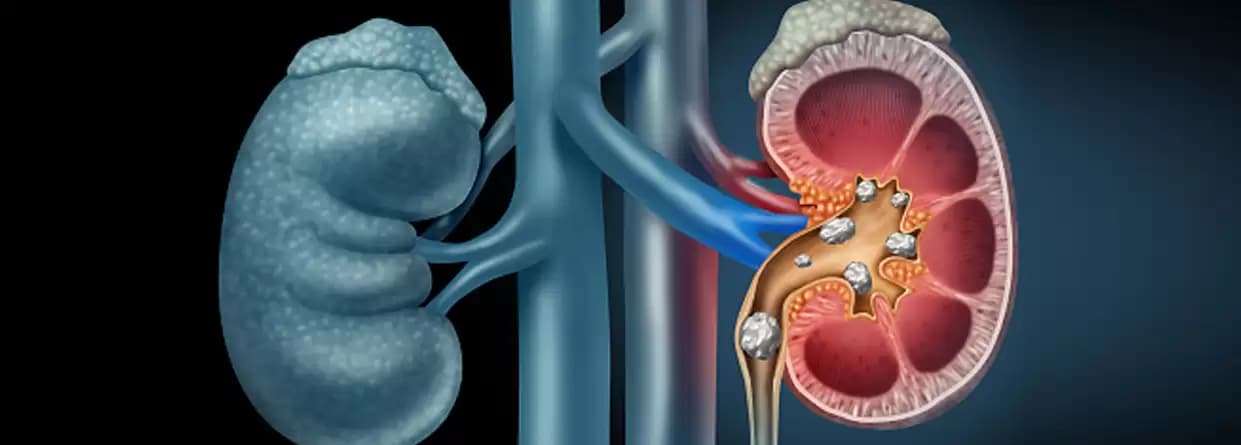
Kidney stones are hard deposits of minerals that form inside the kidneys due to a lack of fluids to dissolve them.
Kidney stones are hard deposits of minerals that form inside the kidneys due to a lack of fluids to dissolve them. In the general course, our kidneys function effectively to filter the waste and fluid out of our bodies through urine; however, when the natural process is disturbed and there is excessive waste and simultaneous lack of fluids to dissolve it, it leads to the creation of hard mass that appear like stones in kidneys. A kidney stone is formed when excessive minerals build up in the urine because of a lack of hydration. These stones can vary greatly in size – these could be the size of a kernel, corn or grain of salt and are often very painful. However, in several cases, the stone might go unnoticed for a long period of time until it starts to stir inside the kidney and move towards the ureter. These stones are brown, yellowish in colour and are soft and hard in texture.
Kidney stones are created when the levels of minerals such as calcium, oxalate and uric acid are very high in the urine and they tend to accumulate over time due to lack of fluids to dissolve them properly.
A small stone might pass through the urinary tract, sometimes on its own or through little medical help. However, in cases where the stone size is relatively big, surgery may be the only solution. Kidney stones in general cases are extremely painful and cause a lot of discomfort.
Thus, the best way to manage this problem is to avoid the problem on the whole – prevent the formation of kidney stones.
It is easy to prevent the formation of kidney stones by making some adjustments in the diet, as well as everyday living.
Staying hydrated: The formation of kidney stones happens basically because of lack of fluids to dissolve the accumulated minerals. Hence, the core to prevent the problem is to drink a lot of water to ensure there is proper dissolution of the minerals in the body. On a general level, a normal person should consume 8 litres of water on a daily basis. Moreover, for people who sweat a lot, additional intake of water needs to be included. Lack of water results in low urine output, causing accumulation of urine salts, leading to the formation of stones.
Eating a calcium-rich diet: Excess calcium does not cause the formation of stones, instead, a calcium-rich dietincluding items such as low-fat milk, cheese, and yogurt is known to prevent the formation of stones.
Reducing sodium intake: Excess salt prevents the calcium from being reabsorbed from the urine to the blood, leading to a heavy concentration of calcium in the urine and the formation of kidney stones. Avoid food such as processed items, canned soups, canned vegetables, and condiments.
Reduce oxalate-rich foods: Foods such as spinach, chocolate, sweet potatoes, coffee, peanuts, wheat bran, etc. are naturally rich in oxalate. A large intake of these foods can cause excessive oxalate to combine with calcium in the urine to form stones
Avoid animal protein: Animal protein such as beef, poultry, fish and pork might get acidic in the body, thereby increasing the concentration of urine acid that causes uric acid and calcium oxalate kidney stones.
Avoiding vitamin C supplements: Only vitamin C naturally present in the food is permitted for the body. Other than that vitamin c supplements can cause kidney stones.
Moreover, on the advice of the doctor, you can also take some preventive medications for stones.
The treatment for kidney stones depends on factors – the size of the stone, the composition of stone, and whether or not it is causing pain or blocking the urinary tract. To know the accurate answer to these questions, the doctor will ask you to get some tests including urine test, blood test, CT scan or X-ray. Once, the results of the tests are clear, the doctor will suggest any of the following options as a course of treatment:
Each case is different and so accordingly, the course of treatment varies. Hence, it is very critical to identify symptoms and consult your doctor well before deciding on a treatment method. Moreover, it is important to know ways to prevent kidney stones in the future.
Written and Verified by:

Dr. Hitesh Joshi is a Consultant Orthopaedic & Joint Replacement Surgeon at CK Birla Hospital, Jaipur with over 6 years of post-PG experience. He specializes in trauma surgery, arthroscopy, and joint replacement.
Similar Renal Sciences Blogs
Book Your Appointment TODAY
© 2024 RBH Jaipur. All Rights Reserved.